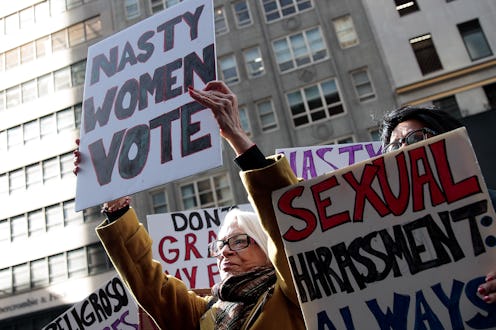"Nasty woman" became one of the most iconic phrases of the 2016 presidential election, with many viewing Donald Trump's insult as a prime example of the sexism faced by Hillary Clinton — and, by extension, women everywhere, especially in the workplace. And according to linguist Amanda Montell's The Dirty Word "How to Overcome Hate" episode, they were absolutely right. Insults, she explains, serve a purpose: To tell people they've overstepped their bounds and should be doing something differently. And "Nasty woman" is a prime example of that function.
Montell tells Bustle over email that she believes insults shaped the outcome of the election. "Some news publications have used words like 'sneaky,' 'selfish,' 'a crook,' 'corrupt,' and 'evil' to describe Hillary Clinton," she says. "These aren't journalistic, objective terms. They're insults. But in an era when facts take a backseat to feelings, this hate speech really works to impact the public's real-life decisions."
And "nasty," she says, is most certainly a gendered insult — and what's more, it's been scientifically proven as such, thanks to a tool created by Northeastern University history professor Benjamin Schmidt. When you plug the word "nasty" into the tool, you'll find that it's used more often in reviews of women professors than in reviews of men.
"The word 'nasty' would sound almost comical if applied to a man," linguist Deborah Tannen told New York Magazine. Montell concurs: "Deborah Tannen is one of many linguists who agree that 'nasty' has evolved to become a subtly gendered term, like 'bossy,'" she tells Bustle. "'Nasty' has evolved to describe a woman who isn’t performing femininity as she ought to."
Here's how exactly insults like this work, according to the episode.
Insults Tell People What They Should And Should Not Be
The function of insults, Montell explains, is to tell people how they ought to act. "Slurs attempt to socialize and condition your behavior to fit the desired characteristics of a particular group. So, if you call someone a 'fat ass,' you're saying that you think that person needs to be thin," she says. "If you call someone a 'freak,' that says you think that person should be more normal or more like you." Therefore, insults don't just reflect an individual distaste for a person; they accuse them of not behaving in accordance with social norms and function to keep people adhering to them.
"Nasty Woman" Is A Perfect Example Of This
"This insult served to accuse Hillary Clinton of acting in a way that Donald Trump didn't think she should," Montell says — particularly, "of not acting ladylike enough." Though "nasty" can be used toward men, it's considered especially insulting toward women, since they're socialized to always be nice. "That was his attempt to shove her back in this box of feminine, submissive behavior," says Montell.
Gendered insults are used toward men, too: While women may be called "nasty" when they're being "masculine," men get called "wimps" and "sissies" for being "feminine," which has also happened during this election. "I've seen a lot of Trump supporters criticize protesters, calling them crybabies," Montell remembers. "By calling someone a wimp or a sissy, you're accusing them of being weak or not macho and masculine in the way that you think that they should be."
Words Matter
For this reason, our words have enormous consequences. When we use insults, we contribute to a society where people believe they need to think or act a certain way — and that they don't have the right to be who they are. "No matter what your politics, I can promise that at some point in your life... someone insulted you verbally in a way that has stuck with you ever since, in a way that's profoundly shaped who you are and how you see yourself," Montell points out. Knowing this, she says, if you disagree with someone and want to insult them,
Remember how profoundly hate speech only works to perpetuate more hate. Remember that insults have a purpose and that's to oppress and to strengthen stereotypes. Instead of talking about people you hate and America you hate, talk about the people you support and the America you hope for. When they go low — even really really low — go high."
Watch the full video above.
Images: wifey/Youtube (3)
